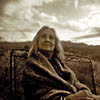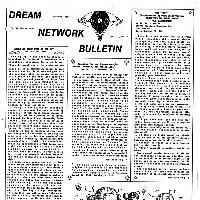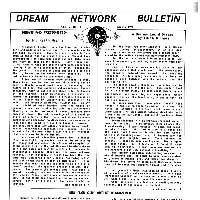I am or she is holding the photo and speaking to him, or he is the face in the photo, and I am or she is saying, “No, you will not kill.” He, as a revolutionary, or they, together, they will do what they must, what they have been doing, what has been necessary, but they are here in this country, this Spain of the Imagination and they will leave without killing. Killing will not be the last act. Killing is not sanctioned. I am, or she is, adamant.
But now I am the Mother in a Spain of the Imagination and I am going to the Teacher. I open the door. I tell her that I am here on my knees. I fall to my knees and I am before her. One can only fall to the knees before someone one trusts implicitly. We are women in a Spain of the Imagination. We have dark hair, our faces are strong and clear, we wear black skirts and white blouses. But if we wore only black you would not be surprised.
I tell her that I have come about my daughter. She is sixteen or she is eighteen. She is the Daughter. She will not kill. I will not allow it. It is not to protect the victim; it is to protect my daughter. She is a revolutionary as we all are, as we must be. But, I tell the teacher with whom I am now collaborating, who understands everything, that I will send the daughter away. She will go to another country. I cannot send her to the United States. It is not a country of such women as we are or we have become. It is not a country that forbids killing.
That young man will go to another country too. That young man who is her partner, in the way the man was my partner earlier, when I held the photo or the portrait and knew that he must not and so would not kill. They will not kill.
I speak this to the Teacher. I am or was on my knees and she was seated on a wooden chair by the windows in the classroom that is empty of children. I fall to my knees and then I rise up. It is possible that I am also the teacher. It is possible that there is only one person in this dream and it is myself and I am playing all the roles. No, I am not playing roles. I am everyone in the dream as I must be because it is a dream and that is how the dream teaches us as there are no others in a dream, there is only what we know or what is being told to us by the dream which is the one that, ultimately, knows what needs to be known.
This is the dream. But it is a dream from a world of the imagination that birthed me when I was a young girl or a young woman and when killing (despite Guernica, despite World War II, despite Hiroshima and Nagasaki) was not killing a person but an act that created another world. In such dreams of language, killing was a word not an act. It was a word that led to another world. Killing was a word, an act that had to come to an end in a dream of life, of words come to life like justice or freedom. A dream of a world in which killing was not ever to have to kill a body that could not understand the horror of killing. To kill and not to kill were the same because they created the world we had to create so that the killing would be over.
It was a world I recognized in an imaginary literature of Spain where I have never been. It was a world I was born into through the dreams I do not remember that have rhythms that might be flamenco and which I found again in the rhythms of the poetry and the literature of Latin America. A dream where the light is different than it is here because of the stone houses I have never seen and will never see, and the way the light fell on them in the curved and cobbled streets of the imagination. Dreams of dark forests, where the trees call the black shadows to them and whisper in a Spanish language that lives only in poetry at night.
In these dreams that are not dreams so much as patterns in other worlds, the women knew what they had to know although their mothers wore veils and were silent and sequestered behind walls in cities called the Alameda or Alhambra, the Red. In the languages of these worlds, the men told the stories of what the women were not to know despite the red, despite the red and the black, despite the red roses, the white walls, the casement windows, the barred windows, or the windows without bars that dreamed of light that was brilliant and dark.
The men who wrote the stories did not know what the women knew and were passing on to the daughters, the daughters who come to me now at this time in my life in my dream. The daughters who are straight and tall, who are revolutionaries in black skirts, who have red lips and carry red roses and will not kill. The women who will not kill, so killing is forbidden. That is how strong they are.
The women say, “This is what we taught you then in the dreams that came to you when you were young, the dreams that you have forgotten that came to you in your childhood, the dreams that formed you and surface now at this time in your life when you are asking what is to be done, what is to be done, what is to be done?”
Dreams, like this one, of the photo of the man who, at the end of what he is to do, is not to kill. The photo is not of the man who is to be killed. The photo of the man with the white face or the dark face with a beard is a photo of a man, who ultimately, because he is the revolutionary, the one who brings justice like the sunlight or the rain, will not kill. The woman says so and so it is so. That is what the dream says. And it says that all of this, the story, the strength, the strength not to kill, the strength that ends killing is in language, in the rhythm of the words, and this is what we have forgotten. Earth, rhythm, language, light, they were to have come together in a poetry from which the future might have arisen if we had listened and learned to speak that language, its rhythms and images, to speak it’s absolute poetry.
But then we forgot or yielded to the trance, to the relentless noise from which our cities dull as old metal and gray egg cartons arise in the fluorescent lights of super markets and endless parking lots and deluded malls which have no music to them and so are not the languages that we had been given to heal the world.
And because of this, because it may not be too late, the dream comes, the dream in another language, the dream in which the woman says, adamantly, “The man, my lover, the woman, my daughter, we will not kill. At the end of the dream, at the end of the dreams, we will not kill.”






